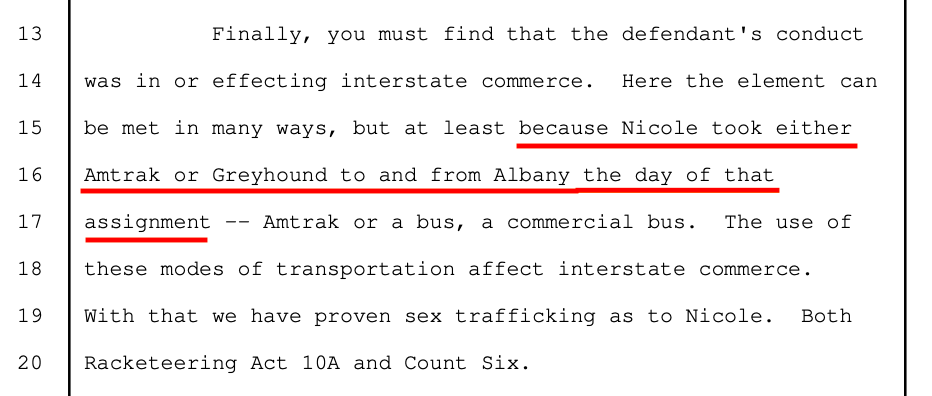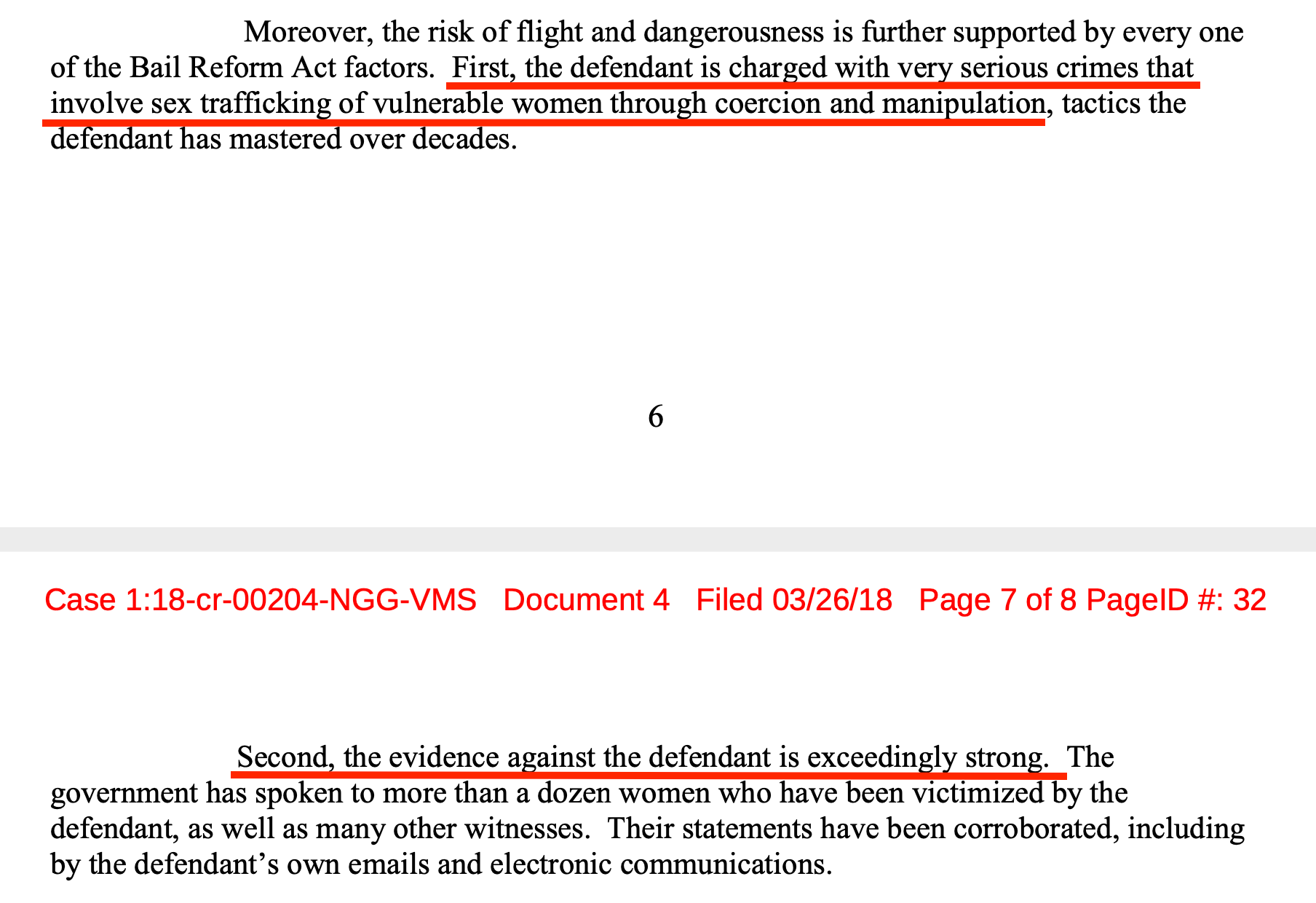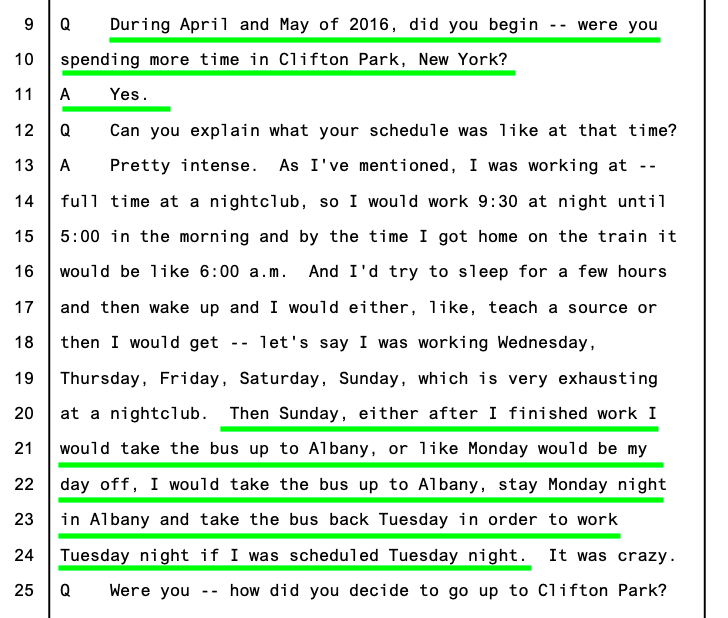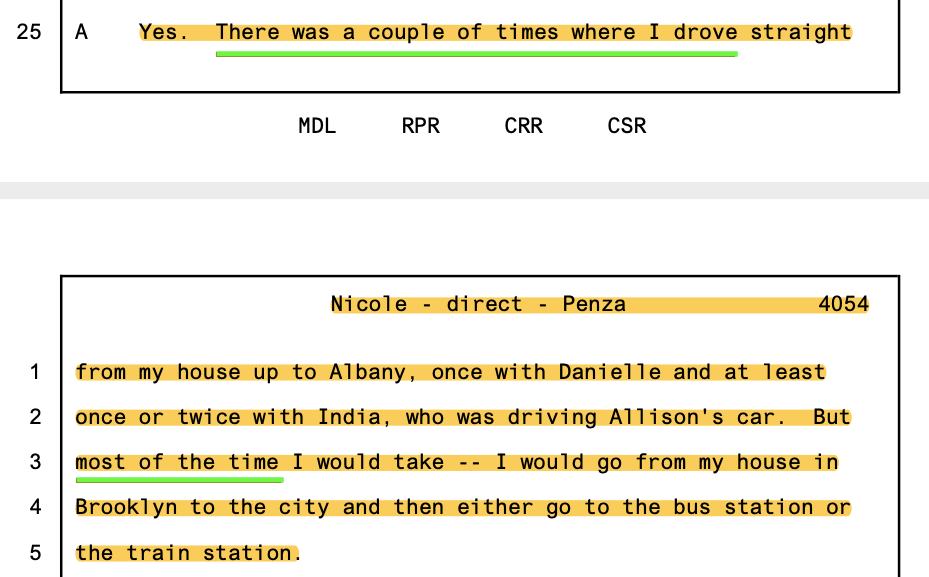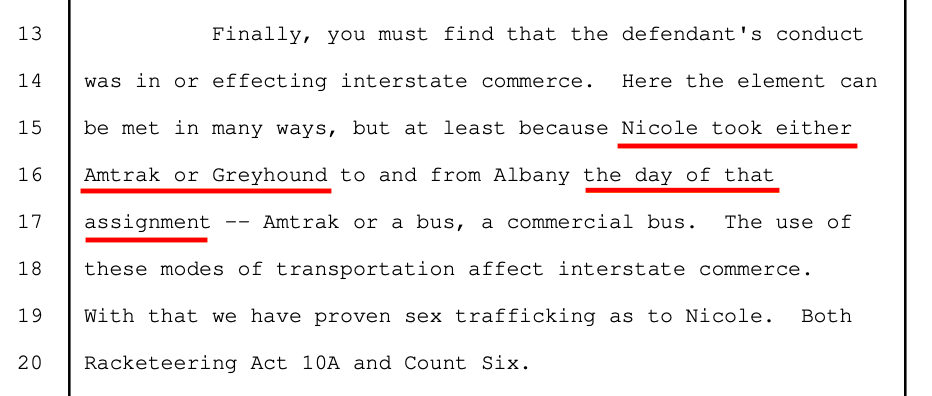Prosecutors lie to justify sex trafficking charge
Sex trafficking is an egregious crime. According to the National Criminal Justice Service, more than 17,500 U.S. citizens are trafficked within the country each year. Sex trafficking is a felony with up to a life sentence in prison as punishment. It is a charge that should not be taken lightly, both by the perpetrators and by the people who prosecute them.
The testimony of a woman named “Nicole” was the centerpiece of the sex trafficking charge at Raniere’s trial. Nicole was an actress involved in NXIVM courses and the NXIVM community, and she knew Raniere for many months prior. Keith Raniere was charged with and convicted of sex trafficking based solely on a sex act that happened with Nicole.
This single sex act with Nicole was the basis for the entire federal sex trafficking charge levied against Raniere – without this one sex act happening, Raniere could not have been charged with sex trafficking. During the act, Nicole was blindfolded and received oral sex from another woman. Of note, Raniere did not have sex with Nicole in this sex act. For this act, he was convicted of sex trafficking and now faces life in prison.
Below, we will show how the prosecution lied both to get jurisdiction to press charges and to try to convict Raniere of sex trafficking. Lies A1 and A2 below lay the groundwork to show the most blatant lie, Lie B. This seemingly subtle lie had far-reaching implications, and takes a very discerning eye to catch and comprehend. It appears almost meaningless: it’s a small lie about the date Nicole traveled. However, the prosecution misrepresented this minor detail because, had they not, their entire federal sex trafficking charge would have no legal basis.
Context for how the prosecution lied to charge Raniere with sex trafficking
Jurisdiction:
For someone to be charged with a federal crime, the prosecutors must prove that they have the jurisdiction to pursue an indictment. Federal jurisdiction is established by alleging that a crime affected interstate commerce. As we will show below in Lies A and B, the prosecutors lied to the Court about what evidence they actually showed to prove that interstate commerce was effected. The implications for this technicality are not small – without interstate commerce being effected, the Eastern District of New York would not have gotten jurisdiction for the sex trafficking charge in the first place.
Elements of a crime:
Every crime has several defined elements outlined in law. The prosecution must prove that every element of a crime was present in order to find someone guilty. For a federal sex trafficking case, prosecutors must show that interstate commerce was effected, otherwise, a defendant should be found “not guilty.” In Raniere’s case, the prosecution had to prove that Nicole’s travel to Albany occurred for the purpose of committing a sex crime, otherwise, there would be no sex trafficking…it would have just been normal travel to Albany, and then sex happening there.
In Lies A and B below, the prosecution tried to falsely establish that interstate travel happened in order to commit a crime. The basis of their entire sex trafficking charge was a lie, hidden deep within 5,000 pages of testimony. We challenge the reader to find it below.
____________________________________________________________________________________
Lie A: Nicole took either a bus or a train to Albany for the sex act
In their closing statements, the prosecution lied by stating they had proven that Nicole took “either Amtrak or Greyhound to and from Albany” on the day of the alleged crime (Evidence for Lie A.1.1) Also, at the onset of the case, they lied by saying that they had “exceedingly strong” evidence for their arguments (Evidence for Lie A.1.2).
Lie A.1.1: The prosecution proved Nicole took a train or bus to and from Albany the day of the alleged crime
Caption: Evidence for Lie A.1.1: The prosecution made a key lie about the day Nicole traveled to Albany. (Link to transcript)
Lie A: Nicole took either a bus or a train to Albany for the sex act
In their closing statements, the prosecution lied by stating they had proven that Nicole took “either Amtrak or Greyhound to and from Albany” on the day of the alleged crime (Evidence for Lie A.1.1) Also, at the onset of the case, they lied by saying that they had “exceedingly strong” evidence for their arguments (Evidence for Lie A.1.2).
Caption: Evidence for Lie A.1.2: In a motion supporting detention, filed on 3/26/18, the prosecution lies about the strength of the evidence for the sex trafficking charge.
Truth A: No evidence was shown proving Nicole took a train or bus to Albany the day of the sex act
For a charge with “exceedingly strong” evidence, the following truths revealed in Nicole’s own testimony contradict the prosecution’s statement above.
Truth A1: Nicole was coming up to Albany weekly for two months
In order to make it appear like the sex act in question was sex trafficking, the prosecution made it seem like Nicole’s travel to Albany was explicitly for the purpose of a sex crime to be committed. Nicole’s own testimony proves that this was not the case. The alleged sex act happened on or just before May 31, 2016. Below, Nicole explains that for at least two months prior to this time, she was coming up to Albany weekly.
The truth is that Nicole’s travel to Albany was part of her regular weekly trips to Albany – there was no special trip designed to “traffic her” to commit a sex crime, as the prosecution falsely portrayed. The suggestion that one of Nicole’s routine trips to Albany (where she was taking classes and meeting with mentors) suddenly became trafficking is offensive to the types of horrific, coercive, and violent transport/smuggling that actual victims of sex trafficking endure.
With the logic that the prosecution used, one could make the following argument: If you go to college classes every week for two months (mostly by bus) and one day the professor tries to steal something from you – then you were trafficked to classes that day so that he could commit this crime. Such logic is a contortion of the truth, it is false, and it doesn’t belong in a court of law.
Evidence of Truth A1: Nicole’s testimony shows that her so-called “trafficking” was actually just part of her routine trips to Albany
Caption: Evidence for Truth A.2: Nicole explains her regular weekly trips to Albany for two months prior to the sex act happening (link to testimony)
Truth A2: Nicole did not always take a train or bus to Albany
In Nicole’s testimony, she said that she sometimes drove to Albany, and that most of the time she took a train or bus. “Exceedingly strong” evidence for a crime that could amount to life in prison would include either sworn verbal testimony or hard evidence (such a receipt, a boarding pass, a credit card statement, etc.) confirming how and when the travel happened. The prosecution provided neither testimony nor hard evidence as proof. So which part of their evidence was “exceedingly strong?” How do we know Nicole took a train or bus on the day the sex act happened? It’s never said or made clear at the trial, other than in the prosecutor’s closing statements.
Nicole testified below that she occasionally drove to Albany and took a train or bus “most of the time” to get there. Here’s why this is important: If Nicole did drive to Albany when the alleged crime occurred, the entire charge would need to be dropped. Why? For a federal sex trafficking charge to be valid, the government needs to establish interstate commerce was affected. Here, the prosecution argued that buying a ticket on a national train or bus company affects interstate commerce – the same cannot be easily said for driving in a private car.
Given the importance of her means of travel, it is curious why the prosecution didn’t ask Nicole to specifically confirm how she got to Albany when the alleged crime happened. She was the only witness for the sex trafficking charge, and the prosecution’s case for the charge rests entirely on her testimony. The prosecution presented zero conclusive proof that interstate travel (and therefore interstate commerce) occurred on the day of the crime, for the intent to commit a crime – no testimony, no hard evidence. There was no evidence, and it was a flat out lie to call this critical point supported by “exceedingly strong” evidence. It was supported by none.
Evidence of Truth A2: Nicole testifies she did not always take a train or bus to Albany
Caption: Evidence for Truth A.2: Nicole indicates that she did not always take a train or bus to Albany. She never confirmed how she traveled the day of the crime, and provided no receipt, boarding pass, etc. Her taking a train or bus is an essential point upon which the entire sex trafficking charge rests. (Link to testimony)
____________________________________________________________________________________
Lie B: Nicole traveled to Albany on the day of the sex act
This lie is difficult to follow, but it is the most egregious and important – it requires close attention to catch, which is how the prosecution got away with it. It is masterful sleight of hand.
Below, the prosecution specifically said that Nicole traveled to Albany on the day of the alleged crime (the alleged crime is referred to as “the assignment” in the transcript below). Saying Nicole traveled on the day of the crime is an outright lie. Wait until you see Nicole’s testimony.
Lie B: Nicole took a train or bus on the day of the alleged crime
Caption: Evidence for Lie B: The prosecution lied by saying that Nicole traveled to Albany the day of the alleged crime. (Link to transcript)
It was important for the prosecution to falsely say that Nicole traveled to Albany on the day the allege crime happened. Without making this false argument above, the entire basis of their sex trafficking charge falls apart . . . it becomes just sex, with no trafficking.
Truth B: Nicole testified she came to Albany (at least) the day before the alleged crime as part of her normal travel there; she was not “trafficked” to Albany.
As you just read in Lie B above, the prosecution argued that Nicole traveled to Albany on the day of the “assignment” (a.k.a. the alleged crime). Below, Nicole’s sworn testimony reveals that she did NOT travel to Albany on the day of the alleged crime. She testified she was already in Albany the day before!
Evidence of Truth B: Nicole testifies she was already in Albany the day before the alleged crime; she did not travel to Albany the day of the crime.
Caption: Evidence of Truth B: Transcripts from Nicole’s testimony show that she did not travel to Albany when the prosecution said she did. She traveled there at least the day before. (Link to testimony).
Why is this CRITICAL? Why would the prosecution lie about such a seemingly small detail? Because it’s a KEY POINT for the sex trafficking charge.
Based on legal tests, routine travel across state lines followed by sex does not constitute the heinous crime of “sex trafficking.” The prosecution created the illusion that the sole reason Nicole came to Albany on that specific trip was because she was a victim who was trafficked for sex that day. The prosecution had to lie about the date of her travel to make it appear that this was the case. Had the prosecution acknowledged the truth – that Nicole was making a routine trip to Albany (Truth A2) one day, and then sex happened in Albany the next day (Truth B) – then the criminal intent of the alleged “bus or train” ride (the “trafficking”) falls apart. The truth is clear: Nicole simply wasn’t “trafficked” for sex that day; she came to Albany at least one day before, as she normally did. She did not travel for the purpose of committing the sex act in question.
In order to make the sex trafficking charge work within the framework of the law, the prosecution had to make an outright lie to the Court about the day of Nicole’s travel. It begs the question: If the sex-trafficking case against Raniere was so “exceedingly strong,” why would the prosecution lie at all, let alone about this critical fact?
Summary:
Nicole was the prosecution’s ONLY witness for the sex trafficking charge against Raniere, and the sole evidence the government provided was her sworn testimony. Nicole’s testimony alone completely contradicted the arguments the prosecution attempted to make to show that Raniere committed sex trafficking.
Remarkably, after a 7-week trial with over 5,000 pages of testimony, the government’s case against Raniere for committing sex trafficking was so weak that the prosecution had to lie about fundamental facts from their own witness’s testimony. Had the prosecution been truthful, no federal sex trafficking indictment against Raniere would have been possible for the EDNY to pursue
